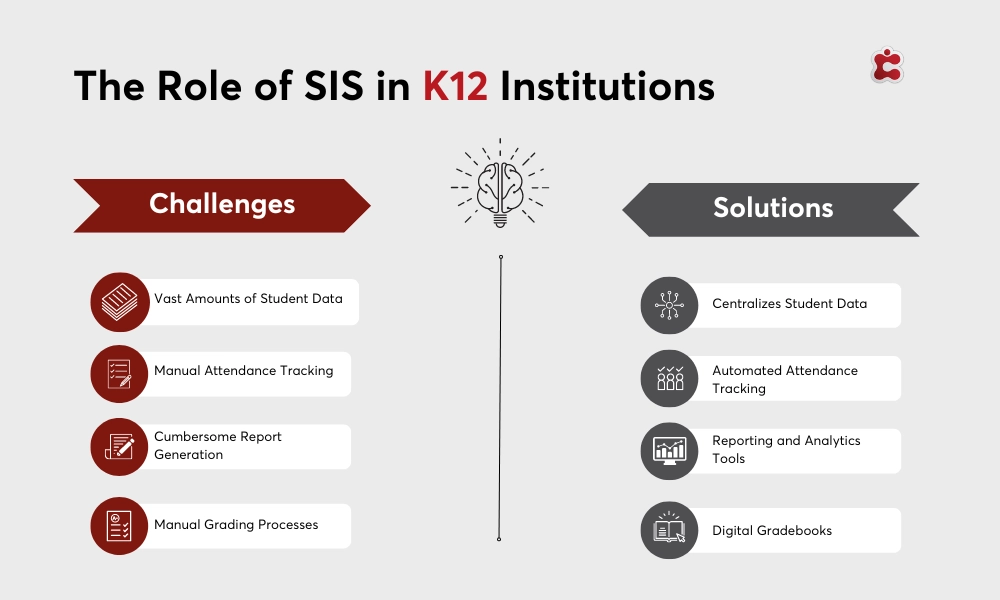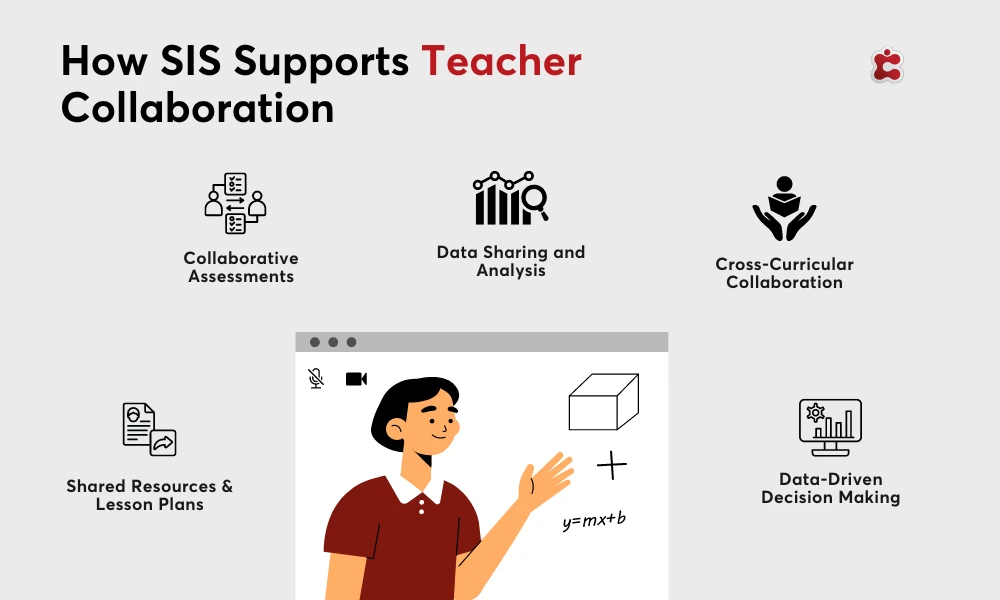A teacher’s main role is to educate, isn’t it? Then why do many educators struggle to prioritize teaching amidst paperwork? A recent study shows that 78% of teachers feel stressed, and the situation worsens over time.
Educators are facing a dilemma where administrative tasks are overshadowing their love for teaching. With paperwork stacking up, grading to be completed, attendance to monitor, and reports to create, teachers are finding it hard to make time for what matters – connecting with their students. This heavy administrative workload takes away hours from classroom teaching. It also erodes an educator’s overall work-life balance. The constant challenge of balancing teaching responsibilities with demands leaves teachers feeling exhausted, stressed, and often overwhelmed. Consequently, the joy that initially attracted them to the profession fades in the face of time-consuming duties.
Integrating Student Information Systems (SIS) in your K12 school can ease this burden by automating these tasks. This gives teachers time to focus on enhancing their students’ learning journeys, which ultimately enhances their work-life harmony and maintains their passion for teaching.

Simplifying Administrative Tasks with Student Information Systems
Student Information Systems consolidate student-related details, transforming how enrollment, scheduling, and updates are handled. One key benefit of using an SIS is the reduction of data entry and the risk of errors that come with it. In the past, educators struggled with data sources, like spreadsheets, paper records, and specialized software, making it difficult to maintain data accuracy. Student Information Systems store all student information in one comprehensive system. This includes demographics, academic records, and attendance logsᅳall in one unified platform. This centralized approach provides educators with insights to make decisions. An example of this process can be seen at AHF Grundschule in Germany, where Classter’s comprehensive solution has significantly enhanced efficiency.
Moreover, Student Information Systems’ streamlined operations greatly enhance the efficiency of K12 institutions. Tasks that used to be time consumingᅳsuch as student registration, class schedule management, and grade updatesᅳare now easier to handle.
The administrative team can quickly access information, allowing them to focus more on initiatives rather than routine data management tasks. This enhanced efficiency leads to cost savings and better resource allocation for the institution.
Enhance Operations Using Classter’s Student Information Systems
Classter’s Student Information Systems is known for its efficiency and innovation. It provides a solution to streamline operations and enhance learning experiences. From enrollment to graduation, Classter’s user-friendly platform empowers K12 institutions to efficiently manage student information, ensuring that all aspects of student management are smooth, secure, and student-focused.
A standout feature of Classter is its student profiles, which enable educators to personalize learning experiences. By monitoring progress, attendance records, and personal milestones, this platform creates an environment where each student’s needs are catered to. The integrated academic scheduling tools optimize learning timetables and reduce scheduling conflicts.
Thanks to the enhanced efficiency brought by Classters technology, educators can dedicate time to student requirements and customize lesson plans for better learning outcomes. Additionally, they can participate in development opportunities to continuously enhance their skills. By empowering educators in their roles, Classters Student Information Systems not only boosts teacher satisfaction but also fosters a dynamic learning atmosphere where students excel.
Insights from Student Information Systems Drive Better Decision-Making
Data obtained from a Student Information Systems is crucial for making informed decisions in K12 schools. These systems offer a wealth of information on student performance, attendance, and engagement, providing educators and school administrators with insights into the effectiveness of their teaching methods.
Through the analysis of SIS data, educators can identify patterns, trends, and areas where students need improvement in their learning. For instance, they can pinpoint topics or skills where students are facing challenges and adjust their teaching approaches to better cater to their needs. Likewise, administrators can utilize data from Student Information Systems to ensure that resources are allocated efficiently.
Moreover, Student Information Systems offer data that allows for interventions to support students at risk. By monitoring attendance trends and academic progress over time, educators can detect students who might be falling behind and provide targeted support services or interventions to help them succeed.

Enhanced Collaboration Through Teaching Resources on SIS
Student Information Systems act as platforms where educators can access, share, and collaborate on a range of teaching materials. By consolidating these resources within the system, teachers are saved from searching for materials across platforms.
The efficient access provided helps save time and lessen the workload involved in planning lessons. This technology promotes collaboration among educators, inspiring them to engage with their colleagues. Having access to a range of teaching resources through Student Information Systems empowers educators to effectively address the needs of their students. Teachers can adjust their teaching approaches to accommodate learning styles, abilities, and interests, fostering inclusivity and active participation in the classroom. A culture of collaboration and growth is created by sharing lesson plans, activities, and teaching method. This enables educators to excel in their roles, ultimately enhancing their well-being.
Sustaining the Love for Teaching
With the integration of Student Information Systems in K12 institutions, the burden of administrative tasks weighing on education staff is dramatically lightened. Freed from the constraints of manual paperwork and administrative duties, teachers can devote more energy to creating engaging learning experiences. By focusing on building meaningful connections with their students, the joy and fulfillment that drew educators to the profession can be explored to its fullest. This shift encourages a healthier work-life balance, reducing stress and burnout among education staff. As a result, teachers experience greater fulfillment and joy in their roles. Thus contributing to a more positive and supportive school environment overall.
Want to ease the administrative burden for your educators?
Join the countless educational institutions worldwide that have already benefited from Classter’s technology.
Take the first step towards creating a more efficient, supportive, and fulfilling learning environment. Explore Classter’s Student Information System and experience the innovation for yourself.
FAQ’s
Yes, by simplifying administrative tasks, Student Information Systems allow educators to reclaim time for personal and professional pursuits.
Yes, Classter offers integration capabilities with other educational technologies such as learning management systems (LMS), assessment tools, and communication platforms
Classter offers training sessions, user guides, and ongoing technical support to educators and administrators to help them effectively use and navigate the system.

